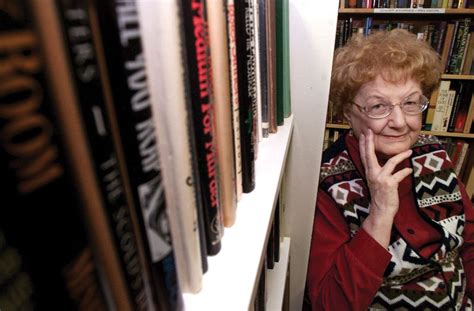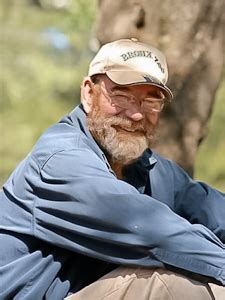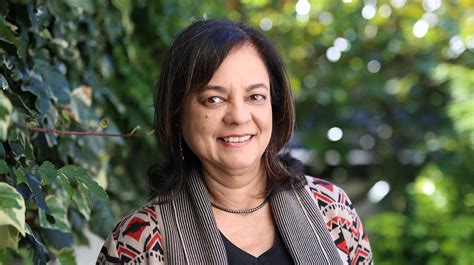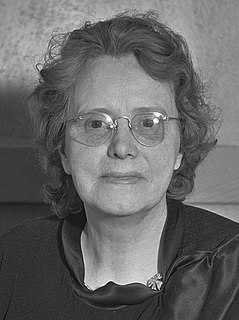A Quote by Andre Norton
... we are each shaped from our birth, not only by the blood and inheritance that lies behind us, but also by those we love and by whom we are loved in turn, by the knowledge given to our thirsty minds, to the learning of ourselves.
Related Quotes
Why do we so mindlessly abuse our planet, our only home? The answer to that lies in each of us. Therefore, we will strive to bring about understanding that we are--each one of us--responsible for more than just ourselves, our family, our football team, our country, or our own kind; that there is more to life than just these things. That each one of us must also bring the natural world back into its proper place in our lives, and realize that doing so is not some lofty ideal but a vital part of our personal survival.
[Grace] is given not to make us something other than ourselves but to make us radically ourselves. Grace is given not to implant in us a foreign wisdom but to make us alive to the wisdom that was born with us in our mother?s womb. Grace is given not to lead us into another identity but to reconnect us to the beauty of our deepest identity. And grace is given not that we might find some exterior source of strength but that we might be established again in the deep inner security of our being and in learning to lose ourselves in love for one another to truly find ourselves.
All of us need an identity which unites us with our neighbours, our countrymen, those people who are subject to the same rules and the same laws as us, those people with whom we might one day have to fight side by side to protect our inheritance, those people with whom we will suffer when attacked, those people whose destinies are in some way tied up with our own.
Also our fellow competitors, who are indeed the people just mentioned - we do not compete with men who lived a hundred centuries ago, or those yet not born, or the dead, or those who dwell near the Pillars of Hercules, or those whom, in our opinion or that of others, we take to be far below us or far above us. So too we compete with those who follow the same ends as ourselves; we compete with our rivals in sport or in love, and generally with those who are after the same things; and it is therefore these whom we are bound to envy beyond all others. Hence the saying.
It may well be feared, that there is not enough Biblereading among us. It is not sufficient to have the Book. We must actually read it, and pray over it ourselves. It will do us no good, if it only lies still in our houses. We must be actually familiar with its contents, and have its texts stored in our memories and minds. Knowledge of the Bible never comes by intuition. It can only be obtained by diligent, regular, daily, attentive, wakeful reading.
What we call our destiny is truly our character and that character can be altered. The knowledge that we are responsible for our actions and attitudes does not need to be discouraging, because it also means that we are free to change this destiny. One is not in bondage to the past, which has shaped our feelings, to race, inheritance, background. All this can be altered if we have the courage to examine how it formed us. We can alter the chemistry provided we have the courage to dissect the elements.
Each one of us needs time and space for recollection, meditation and calmness.... Thanks be to God that this is so! In fact, this need tells us that we are not made for work alone, but also to think, to reflect or even simply to follow with our minds and our hearts a tale, a story in which to immerse ourselves, in a certain sense to lose ourselves to find ourselves subsequently enriched.
This is our Lord’s will, that our prayer and our trust be both alike large. For if we trust not as much as we pray, we do not full worship to our Lord in our prayer, and also we tarry and pain our self. The cause is, as I believe, that we know not truly that our Lord is Ground on whom our prayer springeth; and also that we know not that it is given us by the grace of His love. For if we knew this, it would make us to trust to have, of our Lord’s gift, all that we desire. For I am sure that no man asketh mercy and grace with true meaning, but if mercy and grace be first given to him.
I won't say he [Shakespeare] 'invented' us, because journalists perpetually misunderstand me on that. I'll put it more simply: he contains us. Our ways of thinking and feeling-about ourselves, those we love, those we hate, those we realize are hopelessly 'other' to us-are more shaped by Shakespeare than they are by the experience of our own lives.
The first great commandment was to love the Lord our God with all our hearts, might, mind and strength; and the second was like unto it, to love our neighbor as ourselves. And the best way in the world to show our love for our neighbor is to go forth and proclaim the gospel of the Lord Jesus Christ, of which He has given us an absolute knowledge concerning its divinity.
In this choice of inheritance we have given to our frame of polity the image of a relation in blood; binding up the constitution of our country with our dearest domestic ties; adopting our fundamental laws into the bosom of our family affections; keeping inseparable and cherishing with the warmth of all their combined and mutually reflected charities, our state, our hearths, our sepulchres, and our altars.
The impulse to confession almost always requires the presence of a fresh ear and a fresh heart; and in our moments of spiritual need, the man to whom we have no tie but our common nature, seems nearer to us than mother, brother, or friend. Our daily familiar life is but a hiding of ourselves from each other behind a screen of trivial words and deeds, and those who sit with us at the same hearth, are often the farthest off from the deep human soul within us, full of unspoken evil and unacted good.
Just as love blinds us to imperfections in others, it magnifies those we see in ourselves. But if this is true, then the opposite must also be the case. We can take comfort in the fact that our faults will be invisible to those who love us. The success or failure of any relationship depends not just on how we feel about each other, but on how we make each other feel about ourselves.
It is only in the giving of ourselves to others that we truly live — only with the meeting of our minds — thine and mine — do we become conscious of the divine spark each of us shares — only in sharing in our daily contacts, one with another, in our mutual hopes and fears do we find real peace. The human contribution is the essential ingredient.






































